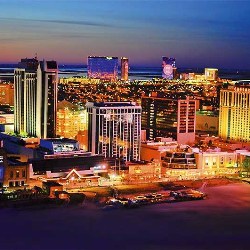Atlantic City Casinos 10 Year Losing Streak Finally Ends

Atlantic City’s casinos have faced hard time since their revenues peaked at $5.2 billion in 2006, and for the last 10 year’s the industry has suffered a continual decline in growth. In fact, it seemed hard to believe that there would ever be any positive news from the East Coast gambling destination, but for the first time in a decade Atlantic City casinos saw their revenues increase in 2016, and they have Internet gambling to thank.
December Posts Impressive Increase
New Jersey’s casino market ended on a positive note after posting revenues of $208.1 million in December, up by 8.5 percent compared to the same month in 2015. From that tally, online gambling contributed $18.4 million, representing not just a 31 percent improvement versus December 2016, but also a new state high, beating the previous record set in July.
Commenting on the positive month, Casino Control Commission Chairman Matthew Levinson said that the year ended “with a bang” because of a 15 percent revenue rise in December, which would have been just 8.6 percent if revenues from the now-shuttered Trump Taj Mahal were included.
“Having New Year’s Eve on a Saturday night, and plain old good luck, provided a big boost for the casinos in December. Every casino licensee reported increased revenue – including two that are internet-only licensees,” explained Levinson.
Casino Revenues Rise 1.5% in 2016
With all the monthly numbers in for the year, New Jersey’s gambling regulators issued a report indicating that the state’s casinos generated $2.6 billion in gross gaming revenue for the whole of 2016, marking a 1.5 percent increase over 2015. While that increase may be modest, it’s still big news for an industry that has suffered a decade of continuous decline.
Individual Operators
The Trump Taj Mahal was closed back in October 2016, with many industry insiders seeing this as a positive thing and believing that the gambling market simply could not support eight casinos. As a result of the Trump Taj Mahal’s closure, over-saturation concerns seem to have been reduced, and a path for the remaining seven casinos to finally succeed has been cleared.
Admittedly, two of the city’s eight casinos did have a lackluster 2016, with Harrah’s casino revenues shrinking by 4.3 percent, and Caesars experiencing an overall revenue decline of 2.7 percent. On the other side of the coin, the Borgata has emerged as Atlantic City’s strongest casino, generating $769 million in overall gaming revenues for the year, earning twice as much as its nearest competitor. Meanwhile, the Golden Nugget and the Tropicana also fared well during 2016, increasing revenues by 9 percent.
iGambling Up 32% in 2016
With the entry of PokerStars into New Jersey’s gambling market in 2016, and the concerted efforts by casinos to attract new players to their virtual tables, internet gambling revenue increased 32 percent to $196.7 million compared to 2015. That figure compares to $148.9 million for 2015, and $122.9 million for 2014.
All in all, the casinos’ 2016 online gambling revenues for 2016 break down as follows:
– Borgata: $47 million
– Golden Nugget: 42.2 million
– Caesars: $38.6 million
– Tropicana: $36.9 million
– Resorts: $31.7 million
Without online gambling revenues, the state’s casino market would have suffered a 0.3 percent decline compared to the previous year, with the vertical now accounting for around 8 percent of New Jersey’s total gambling revenues.
$9.9BN in Tax Collections
For 40 years, the casino industry has brought in much-needed tax revenue to fill the state’s coffers, and a good year for Atlantic City means a good year for the entire state of New Jersey. Even though the tax rate for the gambling industry is set low at just 8 percent, the casinos have paid roughly $9.9 billion in taxes since launching. Parking fees, hotel room fees and other expenditures have also contributed to that revenue, but the majority of the money sent to Trenton has been taxes derived from gross gaming revenues.
Becoming a Tourist Destination
Although 2016 showed that the tide may be turning for Atlantic City casinos, industry insiders caution that the casinos and the city as a whole have more work to do to save the industry. They report that more investments must be made to encourage tourism and generate revenue through hotel stays, dining, shopping and events. If the casinos succeed and can make Atlantic City into a true holiday resort destination, and not just one associated with gambling, then the years ahead could be hugely positive for the Garden State.
Commenting on the important direction for the industry, David Schwartz, director of the Center for Gaming Research at the University of Nevada-Las Vegas, stated:
“At this point, it should be clear that relying on gaming revenues is not the way ahead. There needs to be a focus on broader tourism and diversification into non-hospitality areas.”







